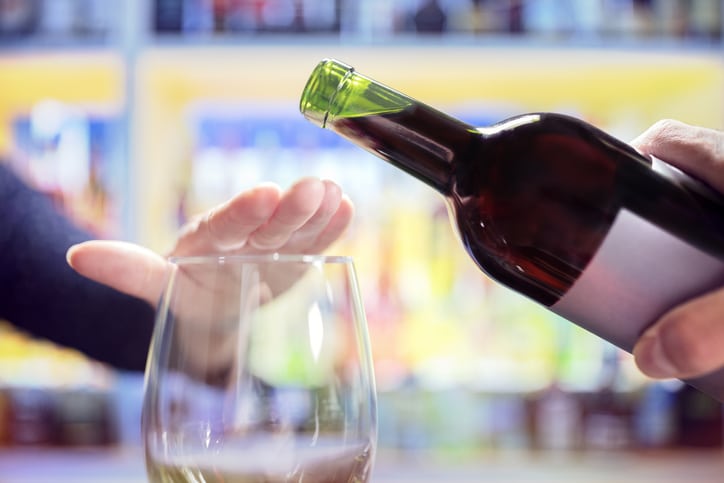It’s no secret that alcohol consumption is a regular, socially acceptable part of many people’s lives. Whether it’s a glass of wine with dinner, beers during the big game, champagne to toast a special event, there’s no shortage of reasons to drink.
While light to moderate drinking doesn’t typically raise too many alarm bells for healthy adults, what exactly pushes someone into the category of struggling with alcoholism? In this blog post, we’ll define the factors that contribute to alcoholism including genetics, lifestyle, personal history, and more.

How Much Alcohol Consumption is Considered Excessive?
What separates the man or woman who enjoys a drink here and there from someone who meets the criteria for excessive alcohol consumption? For women, it’s four or more drinks binged during a single occasion or eight or more drinks per week.
The Centers for Disease Control and Prevention states that for men, excessive alcohol use is defined by five or more drinks binged during a single occasion or 15 or more drinks per week.
Is Alcoholism Genetic?
Yes, genetics can play a role in the development of alcoholism, but it’s not the only factor. It’s a combination of both genetic and environmental factors that can influence a person’s risk.
Certain genes might make someone more likely to develop a dependence on alcohol, affecting how their body processes alcohol or how they respond to its effects.
While experts have agreed there is a hereditary connection, research has shown that repeated alcohol abuse in families isn’t enough to support the genetic argument on its own.
What Environmental Factors Lead to Alcoholism?
The environment a person grows up in can have a significant impact on their risk of developing alcoholism. Growing up in a household where alcohol is commonly abused, or being exposed to heavy drinking in social settings, can also increase the likelihood.
Other environmental influences include:

Stress and Mental Health
When stress, anxiety, or depression hits, alcohol can feel like a quick way to escape those feelings. But over time, using alcohol to cope can lead to dependence.
Instead of dealing with the underlying issues, drinking becomes the go-to solution, making it harder to stop and increasing the risk of alcohol use disorder.
Trauma and Life Events
Going through something traumatic or life-changing, like losing a loved one or experiencing abuse, can make someone reach for alcohol to numb the pain. Experiencing a traumatic event during childhood or in an ongoing situation (making it a complex trauma) can exacerbate the impact it has on you.
While drinking might feel better in the moment, alcohol doesn’t resolve the negative emotions — it just hides it. This can quickly turn into a habit, and the more someone relies on alcohol to handle tough emotions, the more likely it is they’ll develop an addiction.
Social and Peer Influence
Peer pressure and social circles play a big role in making excessive drinking seem okay, even if it’s starting to be a problem. If you’re around people who drink heavily or treat alcohol as a normal part of socializing, it’s easy to get pulled in. Drinking becomes part of the routine, and before you know it, it’s a regular habit.
Availability of Alcohol
When alcohol is easy to get, whether it’s at home, a party, or just around the corner, it increases the chances of drinking more. If someone’s already dealing with stress or other factors, easy access to alcohol can make it harder to resist and easier to fall into a pattern of excessive drinking.
Personality Traits
Some people are naturally more impulsive or drawn to risky behavior. These traits can make someone more likely to drink too much, even when they know it’s not good for them. Over time, drinking becomes a habit, and the more someone drinks, the harder it gets to control.
Family and Social Support
When there’s no support at home or from friends, it can feel isolating, and some people turn to alcohol to fill that gap. The lack of emotional support makes it easier to rely on alcohol for comfort, which can quickly spiral into a bigger problem. Without a strong support system, it’s harder to break the cycle and seek healthier ways to cope.
Signs of Alcoholism
Recognizing the signs of alcoholism early can make all the difference in getting help. Here are some common signs to look out for:

1. Hiding Alcohol Use
People struggling with alcoholism may start to hide how much they drink. They might drink in secret or avoid talking about their drinking habits to friends and family.
2. Drinking More Than Intended
When someone frequently drinks more alcohol than they originally planned, it’s a sign of alcohol use disorder. They might try to cut back but find it difficult to do so.
3. Neglecting Responsibilities
Alcoholism can make it harder to focus on daily tasks, like work, school, or family obligations. Someone with an alcohol use disorder may start missing important events or neglecting their responsibilities.
4. Increased Tolerance
As a person drinks more regularly, their body builds a tolerance to alcohol. This means they need to drink more to feel the same effects. Increased tolerance is a key warning sign of alcohol dependence.
5. Cravings for Alcohol
Experiencing strong urges or cravings to drink is another sign of alcoholism. These cravings can be hard to ignore, making it feel impossible to stop drinking.
6. Drinking in Risky Situations
Drinking in unsafe situations, like while driving or operating machinery, shows a lack of control. It can be a sign that alcohol use is getting out of hand.
7. Guilt or Shame About Drinking
Feeling guilty or ashamed about how much alcohol someone is consuming often leads to trying to hide the problem. These emotions can also make it harder to seek help.
8. Withdrawal Symptoms
When someone tries to stop drinking, they may experience withdrawal symptoms like shaking, sweating, or nausea. This indicates that their body has become dependent on alcohol.
Overcome Alcohol Abuse at The Meadows
If you’re struggling with excessive drinking or alcoholism, no matter the reason, we can help you heal and rebuild your life. Contact our team today to find out how our program can give you the tools, encouragement, and support you need to live a fulfilling life outside of substance abuse.
Alcoholism FAQs
Can Someone with No Family History of Alcoholism Still Develop it?
Yes, even without a genetic predisposition, environmental factors like peer pressure, stress, or exposure to heavy drinking can lead to the development of alcohol use disorder.
How Much of Alcoholism is Genetic?
Research suggests genetics account for about 50-60% of the risk, but the remaining factors come from the environment, lifestyle, and personal choices.
Is Alcoholism a Choice?
No, alcoholism is not a simple choice. While drinking may start as a voluntary behavior, over time it can lead to physical and psychological dependence. Genetics, environment, and mental health factors all contribute to the development of alcohol use disorder.
How Does Alcoholism Start?
Alcoholism often starts with casual or social drinking, but over time, the body and mind can develop a dependence on alcohol. Drinking to cope with stress, trauma, or emotional pain can accelerate the process, leading to addiction.
What Are the Long-Term Effects of Alcoholism?
Long-term alcohol abuse can cause liver damage, heart disease, brain damage, and an increased risk of certain cancers. It can also negatively impact relationships, employment, and overall quality of life.
Can Alcoholism Be Prevented?
While you can’t fully prevent alcoholism, certain steps can reduce the risk, such as managing stress, avoiding heavy drinking, and seeking help early if drinking becomes problematic.
What Are the Treatment Options for Alcoholism?
Treatment for alcoholism can include therapy, support groups, inpatient or outpatient rehab programs, and medications. The best approach depends on the severity of the addiction and the individual’s needs.
If you’re researching treatment options on behalf of a loved one and are looking for more information, we have a library of videos to offer guidance to family members like you.

